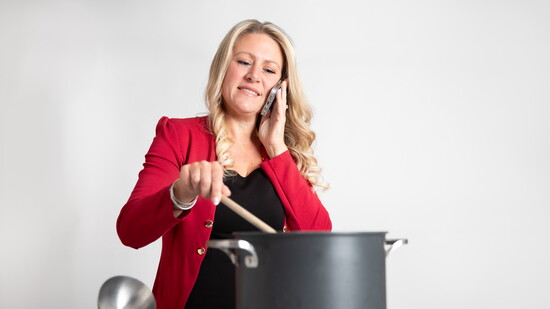Like a new sapling found green and growing amid the ruins of a devastating forest fire, there’s one thing that symbolized new growth after the nightmare of our social shutdown a few years ago.
There’s been an easier path to achieving some measure of work/life balance.
Most companies were forced to embrace a work from home model, with many still offering at least a hybrid situation to this day. That’s been a seismic shift for many people’s ability to schedule their time, be productive, and keep their lives moving forward.
Jessica Sprague is someone grateful for the opportunity to have that equilibrium in her life. As a family law attorney her time is in great demand, so she’s seen the boon of the change firsthand. Living in West Milford, simply getting to her workplace in Florham Park impacts her already extended workday.
“I’m extremely lucky and thankful that my mom lives so close. She’s been my childcare support, especially when they were younger, before I was able to primarily work from home,” Jessica admits. “Now, despite the long hours, I can be present for my kids – getting them off to school
and being there when they get off the bus. It’s not easy, sometimes I have to still take calls in the car, and have some meetings and events at night. The balance still takes work. It’s a matter of being there. That’s the blessing.”
On Empowering Women
Specializing in family law, Jessica has to navigate some intense emotional situations with her clients. She cites something that she learned from one of her mentors, Judge John Selser.
“He taught me so much about the emotional side of this. You know, being a family law attorney, I'm dealing with people at their worst, some of the best people at their worst time. In criminal court, you've got the worst people on their best behavior. And in family court, you have the best people on their worst behavior.”
“I actively encourage all my clients, male or female, to seek a therapist because I'm not a therapist, right? I'm an attorney,” Jessica says. “Women are more likely to actually listen to that advice.”
“A lot of my women clients, especially stay-at-home moms who have not been in the workforce do tend to need more guidance in what steps they’re going to need. Some have never had to pay bills before, so setting them up with a financial planner, or helping to make them aware of other resources to get through those next steps. And sometimes there’s a possibility that maybe they’re not going to have their kids a hundred percent of the time. That’s a very hard thing to get through.”
One of the important things to remember, Jessica says, is to be able to simply ask for help. Especially when it comes to family.
“Looking back and realizing even if it's not always easy to have a relationship with your family, they are still your family. And, except for some unfortunate situations, most of the time, family is going to be there to help you and support you. I think a lot of times we're unable to really ask for that help that we need. But if you ask for it, you can be thankful that they really, truly are there for you.”
On Imposter Syndrome
“I do think women tend to compare themselves more to other women than men versus other men. I think that's just innate in women in general, like whether we're comparing our looks, comparing our families, there's so many things. I just think women in general tend to compare ourselves, not necessarily outwardly, but inwardly. We ask ourselves ‘am I as good enough as that person is?’”
Social media is not helping to get past imposter syndrome, no matter who we are.
“You have to kind of try and distance yourself at points from social media’s influence and not get yourself so ingrained in that. I do think psychologically it's not good, especially for young girls.”
On Encouraging Gratitude With Your Kids
“I think it's a lot of honest and open communication about what's going on in their lives, because I don't think parents necessarily communicate enough with their kids. I think it's easy for all of us to come home from our day of whatever we're doing and sit on a phone or TV and not have honest conversations,” Jessica admits.
“My oldest has been going through a lot this past year. He tore his quad tendon in the winter, had surgery and had to go through the recovery process. Then literally was just about to go back to football and he broke his ankle. So, it's like, that mindset of ‘nothing's going right, nothing's working, etc.’ So I have conversations with him. ‘You know, it's not always going to be that way. Reminding him of the good things in his life, and to be thankful for them. ‘Right now it sucks. But it will get better, you know?’”
That simple lesson of helping the best people at their worst times pays everyday dividends. It’s one that Jessica has mastered.
